
– 11-02-2024 –
Sixth Sunday in Ordinary time
Gospel reading: Mark 1:40-45
vs.40 A leper came to Jesus and pleaded on his knees:
“If you want to” he said “you can cure me.”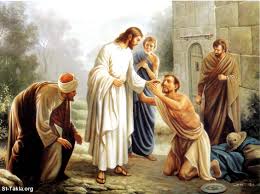
vs.41 Feeling sorry for him, Jesus stretched out his hand and touched him.
“Of course I want to!” he said “Be cured!”
vs.42 And the leprosy left him at once and he was cured.
vs.43 Jesus immediately sent him away and sternly ordered him,
vs.44 “Mind you say nothing to anyone, but go and show yourself to the priest, and make the offering for your healing prescribed by Moses as evidence of your recovery.”
vs.45 The man went away, but then started talking about it freely and telling the story everywhere, so that Jesus could no longer go openly into any town, but had to stay outside in places where nobody lived.
Even so, people from all around would come to him.
************************************************************
We have three commentators available from whom you may wish to choose . Scroll down to the name of the commentator.
Michel DeVerteuil : A Holy Ghost Father, Teacher of Lectio Divina
Thomas O’Loughlin: Prof of Hist. Theol. University of Nottingham NG7 2RD
Donal Neary SJ: Editor of The Sacred Heart Messenger and National Director of The Apostleship of Prayer.
****************************************
Michel DeVerteuil
Lectio Divina with the Sunday Gospels
www.columba.ie
General Comments
Today’s passage is in three sections:
– verses 40-41: Jesus heals a leper;
– verses 42-45a: Jesus protects his identity;
– verse 45b: the people still come to him.
As with last week’s passage, we are free to focus on one section alone or to see the three sections as a unit, one moving into the other.
1. The healing of lepers is a feature of Jesus’ ministry – appropriately, since leprosy is a powerful symbol of the alienation which he came to free humanity from. In meditating on this passage, we are free to identify the particular form of leprosy we have experienced. We will then become freer to decide for ourselves who we want to identify with:
– the leper, the one who has been healed from uncleanness;
– Jesus, the one who brings the marginalized into the community.
The story is told imaginatively and every detail can touch us:
– the helplessness of the leper, “pleading on his knees”;
– the pathetic “if you want to” – the leper dares not put too much hope even in the
one he knows can cure him;
– the immediate healing once he is touched.
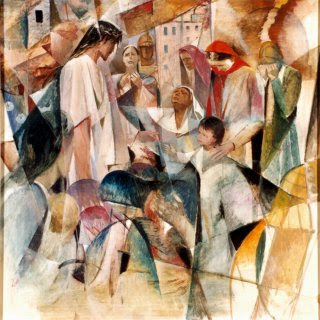 Then there is the greatness of Jesus
Then there is the greatness of Jesus
*entering into the pain of the man (“feeling sorry for him,” as the Jerusalem Bible translation has it, does not fully convey the compassion for the man that Jesus feels in his heart);
* Jesus “stretching out” his hand, indicating that he must reach far out from where he is at present in order to meet the leper where he is;
* once the man has been touched the healing is immediate.
2. This section introduces the theme of what scholars have termed “the messianic secret” – Jesus’ vain attempt to conceal his identity until the time is ripe. This messianic secret is related in all three synoptic gospels, but it is stressed most strongly in St Mark. Scholars have done extensive research to determine what was Jesus’ motive for insisting on the messianic secret. 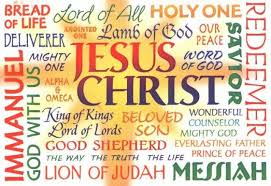 In lectio divina however, our approach is to start from our human experience. We ask ourselves questions like:
In lectio divina however, our approach is to start from our human experience. We ask ourselves questions like:
– what in our experience corresponds to the messianic secret?
– what does our experience teach us about why Jesus insisted on the messianic secret?
– how does the concept of the messianic secret help us to understand ourselves and
the way we must live out our vocation in the world?
This approach from experience reveals that all of us human beings have to work out for ourselves what is our God-given mission in the world, what we have to offer others that no one can do in our name. Like Jesus, we will find that we must struggle to preserve our “messianic secret.” We do not allow others to define our mission to them.

Our passage, if taken as a unit, brings out that those whom we have helped and who admire us are among the “others” we must resist. Our success with them can be an obstacle to our remaining faithful to our personal vision. They remind us that we have touched them but we learn from gospel passages like this one that it was a painful struggle for Jesus, as it is for us.
3. Leaders who speak from their inner truth are very precious. Nowadays many leaders are content to make conventional statements – “this is what I am about”. What St Mark says of Jesus will be true of all those to whom we relate – we may be unpopular to them; it will seem very hard for them to reach us. These things don’t matter however – “even so, people from all around will come to us.”
This must also be what attracts people to the Church. It is not our business to make ourselves attractive. All the Church’s efforts must be devoted to being true to its vision. Often in history, the Church has gone along with the values of the world.
There were times when we accepted slavery,
supported the imperialist ideology of the colonial powers,
allowed ourselves to be protected by the armies of states.
We thank God that in many parts of the world, in recent centuries,
the Church has learned to keep its distance from these popular sayings –
like Jesus we must learn to “stay outside where nobody lives.”
Prayer Reflection
“People are made people through other people.” … an old African proverb
Lord, we remember a time when we felt unclean:
– we were ashamed of our sexuality;
– we did something which made us want to hide ourselves;
– we let down our fellow workers or our team;
– we deceived someone who trusted us;
– we betrayed the ideals of a social movement we belonged to.
Like the lepers in Jesus’ day,
– we felt isolated, unclean, with no sense of self-worth;
– we didn’t want to mix with friends or family.
 Then one day we felt able to come to someone who we felt could bring us healing:
Then one day we felt able to come to someone who we felt could bring us healing:
one of our parents, a friend or neighbour,
a priest or other member of our church community.
We remember how we felt at that moment, pleading on our knees, not literally perhaps,
but our body language showed how nervous and insecure we were – like the leper –
hopeful and yet so unsure of ourselves that even though we trusted the person,
something within us still whispered, “If ….you ….want ….to….”
We thank you for the compassion of that Jesus person,
laughing off our doubts and saying, “Of course I want to!”
stretching out a hand across the wide expanse which separated us,
so that we felt touched and held.
There was no more to say then, the warmth in that touch said, “Be cured!”
and at once we were cured of our feelings of uncleanness,
and we felt able to show ourselves to the community.
 Lord, we think today of societies torn apart by ancient feuds,
Lord, we think today of societies torn apart by ancient feuds,
so that the different communities look on each other as lepers:
– dissenters and those who accept the status quo in the United States and other prosperous countries
–Israelis and Arabs in the Holy Land and Gaza
– Tamils and Sinhalese in Sri Lanka
– Catholics and Protestants in Northern Ireland
– warring factions in the Republic of the Congo.
We thank you for sending them people like Jesus who recognise
in those of the opposing side human beings who beneath their hostility
are really pleading to be accepted and to belong to the wider community.
Like Jesus with the leper,
– they assure these others that they want to work together with them,
they are anxious to stretch out their hands
across the centuries of violence and deeply entrenched barriers.
– They touch them, and it seems that in an instant
resentment, suspicion, inability to forgive and to trust are overcome.
“To have convincing authority we must share the journeys of people, enter their fears, be touched by their disappointments, their questions, their failures, their doubts.“ …Timothy Radcliffe, O.P.
Lord, as a Church in the various communities that make up our state,
we want to care for those who are neglected by the majority
– those who are divorced and remarried;
– members of the gay/LGTB communities;
– those who belong to a lower class than ourselves;
– members of a different culture or sub-cultures to us.
Forgive us that we want to care for them while standing aloof and feeling superior,
so that we become angry when people are suspicious of us
and wonder whether we really want to reach out to them.
We pray that our Church may have Jesus’ generosity of spirit
which will allow us to understand how leprosy breeds suspicion,
so that we will brush away their doubts
and stretch our hands as far as we need to,
until we can touch their pain and they will feel part of our community.
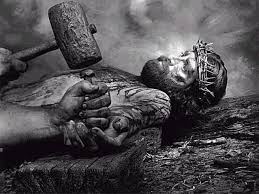 Lord, it is a long and painful struggle to remain true to ourselves, and we thank you that your Son Jesus underwent that struggle with us.
Lord, it is a long and painful struggle to remain true to ourselves, and we thank you that your Son Jesus underwent that struggle with us.
On the cross he remained faithful while the chief priests and elders taunted him,
at other times too, he had to keep his distance from those who admired him,
talked freely about his great deeds and told his story everywhere.
We pray that we may be stern like him in being faithful to our personal goals,
like him refuse to go openly into any town
and spend long periods in places where nobody lives.
Even so, people from all around will come to us,
and we will then be able to relate with them from the truth of ourselves.
Lord, forgive us, your Church,
for the times when we have allowed ourselves to be defined by those whom
we have helped:
– the graduates of our schools;
– those who have been cured at our hospitals;
– the conquistadors, political masters and colonial governors with whom we collaborated.
Forgive us that we felt proud when they started talking about us freely
and telling the story everywhere.
We thank you that in many countries of the world, in South America and the Far East
your Church took the decision to follow in the footsteps of Jesus
and reach out to those whom society treats as lepers,
even though this meant becoming isolated,
no longer going openly into any town, staying outside where nobody lived.
A strange thing happened – even so, people from all around kept coming to hear him!
********************************************************
Thomas O’Loughlin
Liturgical Resources for the Year of Matthew
www.columba.ie
Introduction to the Celebration
 We live in a world of suffering:
We live in a world of suffering:
*suffering caused by diseases,
*suffering caused by the exclusion of people,
*suffering caused by greed and jealousy. But rather than just say that is ‘the lot of humanity‘ we look towards Jesus as the one who brings healing, who welcomes people into his embrace, and who proclaims a new way of living. To belong to this community is to recognise the mystery of God’s forgiveness and healing made visible to us in Christ Jesus, our Lord.
Homily Notes
1. There is always a strange tension when we gather as God’s people. On the one hand, we become conscious of our unity in the Christ: people who are sisters and brothers in baptism. The way we speak at the liturgy reminds us of this. On the other hand, we recall in prayer the brokenness of humanity: people who are sick, people who are warring with one another, people who are suffering because of the actions of fellow humans. Today we remind ourselves that Jesus entered into this suffering world bringing healing and peace, and that he has called us to carry on this work of reconciling people to one another and to the Father.
2. Put bluntly, if we want to gather here as sisters and brothers – and that is the condition of taking part in the Eucharist –then we have to be individuals who bring healing and forgiveness to those we encounter.
3. Jesus encountered the man with the skin complaint, touched him and brought healing. We encounter others and touch their lives; that encounter should be one that promotes peace and trust between people.
 4. We often get carried away by the wow-factor when we hear of Jesus’s miracles. Then instead of concentrating on what they show us about the world God wants, we ask questions about how it could happen. Miracles show us another world. The question is not ‘how did that happen but ‘how can we make this glimpse of another world a plan for our action in this world?
4. We often get carried away by the wow-factor when we hear of Jesus’s miracles. Then instead of concentrating on what they show us about the world God wants, we ask questions about how it could happen. Miracles show us another world. The question is not ‘how did that happen but ‘how can we make this glimpse of another world a plan for our action in this world?
5. Likewise we often get carried away by high-sounding ideas: the world would be a better place if only … and if only … and if only; but then nothing happens. In the gospel we hear of Jesus the healer of humanity when he meets one sick person; and something happens. We meet as his people who have a vision of a transformed society, and which is built up whenever any one of us makes a difference to someone who is ill, or excluded, or marginalised.
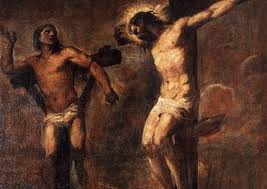
6. The odds are that each of us gathered here will encounter one fellow creature during the coming week who is our equivalent of the socially isolated sick person: someone on the margins of society, reviled, suspected, suffering. When that person encounters us will she or he encounter more of the same or will it be more like encountering the Christ? The greatest miracle of change may be in how we react in that encounter.
***************************************************
Donal Neary SJ
Gospel Reflections
www.messenger.ie/bookshop/
People make a Difference
Any story involving leprosy is a story of inclusiveness with Jesus. The people whom nobody wanted were deep in his heart. Jesus wanted to make his life better and in this case, the man was cured. The news spread of this new religious man, a prophet maybe, but one who went where nobody else would go.

Jesus sees into our hearts
Jesus sees into the heart and there he finds a home, because God his Father lives in each of us. His motivation is his deep relationship with all of us. He will cleanse any of the unacceptable sides of ourselves so that we see ourselves as image of God, forgiven and clean. Can we see others like that?
Who would be those he would reach today like this? Maybe the people who want to change their lives from condemnation by self and others. We can name them often, and our society can be cruel on prisoners and their families, abusers of any sort, prostitutes, victims of AIDS and many others. He offers a way out of condemnation and that is often through the goodness and care of another. When we come to him, we meet his followers, and that also can make a difference.
Recall someone who made a difference in your life at a bad time.
Give thanks for it!
Jesus, healer of souls, heal what keeps me from loving like you.
*********************************************